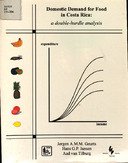Domestic demand for food in Costa Rica: a double-hurdle analysis

View/
ISBN
978-9977-57-272-79977-57-272-0
Date
1997xmlui.dri2xhtml.METS-1.0.item-location
Turrialba, Costa Rica
Type
Libro
Metadata
Show full item recordDescription
100 pág, tab, ref
Abstract
This paper analyzed the structure of domestic food demand in Costa Rica at the level of the household, given prices, income, location, and household size. Using data from the 1987/88 National Household Income and Expenditure Survey for approximately 3900 households spread over the entire country., Engel functions were estimated for a total of 24 different food product categories. Rather than the Tobit specification which is commonly used to take account of zero purchases, Cragg-type double hurdle models were employed to estimate expenditure and price elasticities. In this way, both the infrequency-of-purchase phenomenon and marketing participation behavior were captured, allowing the decision whether or not to purchase an item from a particular food category to be independent of the decision regarding the quantity purchased. The elasticity estimates obtained in this study can be considered superior to those reported in other studies which results are either implausible or imprecise.
Keywords
Publisher
Centro Agronómico Tropical de Investigación y Enseñanza (CATIE)
Is part of
Serie Técnica. Informe Técnico
URI (Permanet link to cite or share this item)
https://repositorio.catie.ac.cr/handle/11554/1281Collections
- Publicaciones y documentos [3628]

